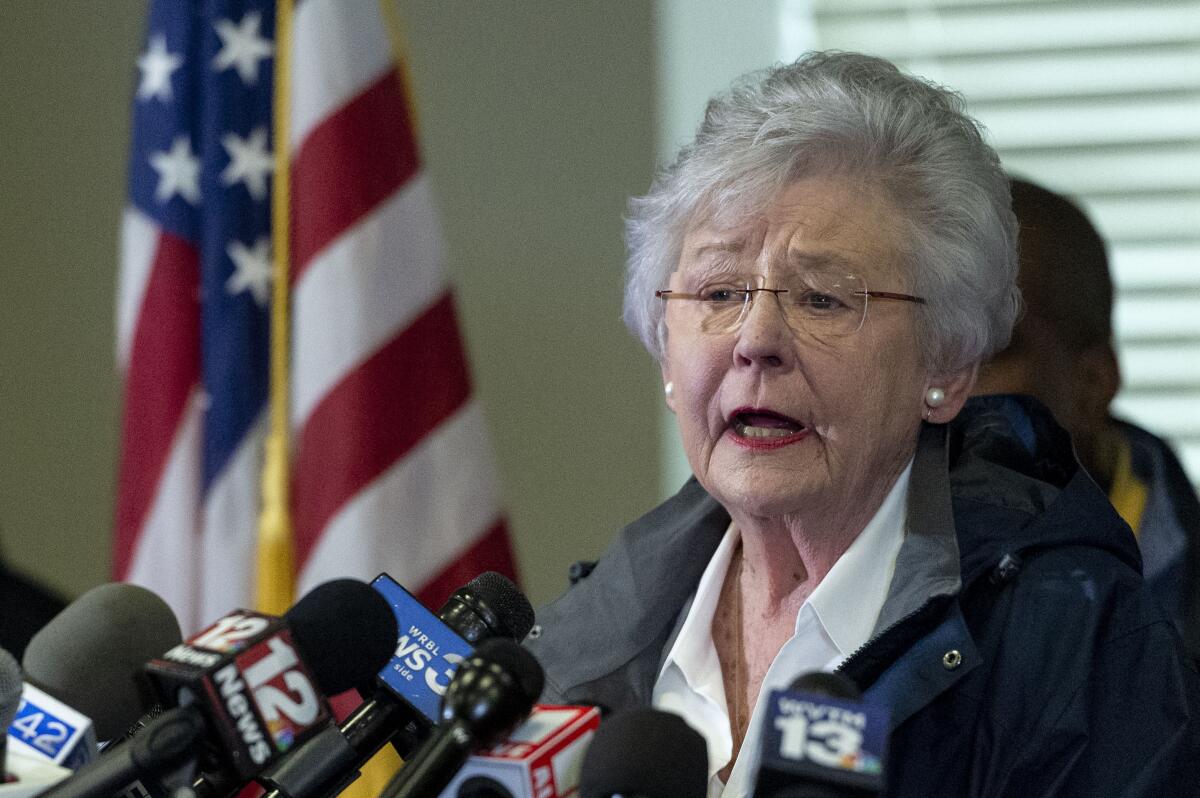Column: Alabama prepares to execute another Black man, under laws going back to slavery

When Alabama’s Gov. Kay Ivey signed the state’s controversial Alabama Human Life Protection Act, a law that all but bans abortions in the state, she said “to the bill’s many supporters, this legislation stands as a powerful testament to Alabamians’ deeply held belief that every life is precious and that every life is a sacred gift from God.”
Tell that to Willie B. Smith III.
The state plans to execute the 51-year-old Smith on Thursday. So much for all that “every life” is precious talk.
Smith was sentenced to death in 1992 for the 1991 abduction, robbery and murder of Sharma Ruth Johnson. The victim, the sister of a police detective, was reportedly shot execution style at a cemetery. Her body was found in the trunk of her burned car. Smith and two other men are said to have stolen $100 from Johnson, a white woman, before shooting her in the back of the head with a shotgun. It was a horrible crime — but the state’s idea of justice seems to be in conflict not only with the words of its governor but the U.S. Constitution.
In 2002, the Supreme Court ruled that executing people who are intellectually disabled violates the 8th Amendment’s prohibition against cruel and unusual punishment. Smith’s defense expert estimated his IQ at 64. The prosecution said it was at 72. The state’s threshold for execution has been 70, which partly explains why the court rejected Smith’s claim — ignoring the findings of the defense’s expert in the process.
Sadly, Smith’s situation is not an outlier. The Death Penalty Information Center reviewed more than 130 cases in which the death penalty was overturned because the defendant was intellectually disabled. It found that more than 80% of those cases involved people of color. What Alabama is doing to Smith, who is Black, is even more appalling when you consider that a federal appeal court agreed that Smith would not have been subject to execution after the Supreme Court’s 2002 decision, but because Smith was sentenced before 2002, it was allowed.
That’s right, Alabama — the state that claims life is a sacred gift from God — wants to put an intellectually disabled man to death because of bad timing.
In no way am I trying to minimize the crime Smith was convicted of or the pain caused by Johnson’s murder. But the death penalty in this case — and in other cases — raises questions about the entire system. We are all familiar with stories of the wrongly convicted being set free years later. Cases like that of the Exonerated 5, in which five Black and Latino teenagers were wrongly convicted of the assault and rape of a white woman in Central Park in 1989. They were exonerated when the lone assailant came forward 13 years later to confess to the crime.
In late January, Rosa Jimenez was released from prison after 17 years, exonerated for a crime she did not commit with the help of the Innocence Project. She was wrongly convicted in the death of a toddler in 2005. Last year, the WNBA star Maya Moore was instrumental in getting Jonathan Irons out of prison after two decades of wrongful incarceration. This has happened so often that in 2004, Congress passed the Justice for All Act, which provides that those exonerated of federal crimes receive compensation — up to $100,000 for every year on death row.
It makes no sense to recognize the need to compensate those wrongly convicted, and yet still accept the use of the death penalty — a punishment that can’t be reversed. This is just one of many things that flies in the face of rationality in a nation where pro-life politicians support the death penalty.
But hiding behind bad timing, as in the case of Smith, is simply unconscionable. “Virtually everything about this case is disturbing,” said Robert Dunham, executive director of the Death Penalty Information Center. “Not only is Willie Smith intellectually disabled, two jurors voted for life. Alabama is the only state that allows death sentences to be imposed based on non-unanimous decisions.”
A practice, Dunham said, rooted in racism.
“After slavery there wasn’t sufficient number of workers to work the plantations so Southern states started doing convict leasing,” said Dunham, who has more than 25 years of experience as a death penalty litigator. “That still didn’t provide enough workers so they started making it easier to convict people.”
And to be clear, he means Black people.
“The modern legacy of slavery and Jim Crow is present throughout our judicial process and very often looks like an instrument of racial oppression more than justice,” Dunham said.
When I read what happened to Johnson, my heart sunk. It was a heinous crime and I can’t imagine what her family must be feeling. But I do know what it’s like watching our criminal justice system behave like a revenge system. I do know about outrage as I watch Alabama use “bad timing” as justification to sidestep the 8th Amendment. How sacred of a gift from God can life be if it becomes devalued as soon as it enters the justice system?
If Smith is executed in Alabama on Thursday, that tragedy will follow a move toward the light in Virginia last week. On Friday, lawmakers in Virginia voted to abolish the death penalty, which would make it the first state of the Confederacy to do so. I hope that moral action catches Gov. Ivey’s attention, if not remind her of her own words — that every life is precious. Even the ones convicted of a crime.
@LZGranderson
More to Read
A cure for the common opinion
Get thought-provoking perspectives with our weekly newsletter.
You may occasionally receive promotional content from the Los Angeles Times.











